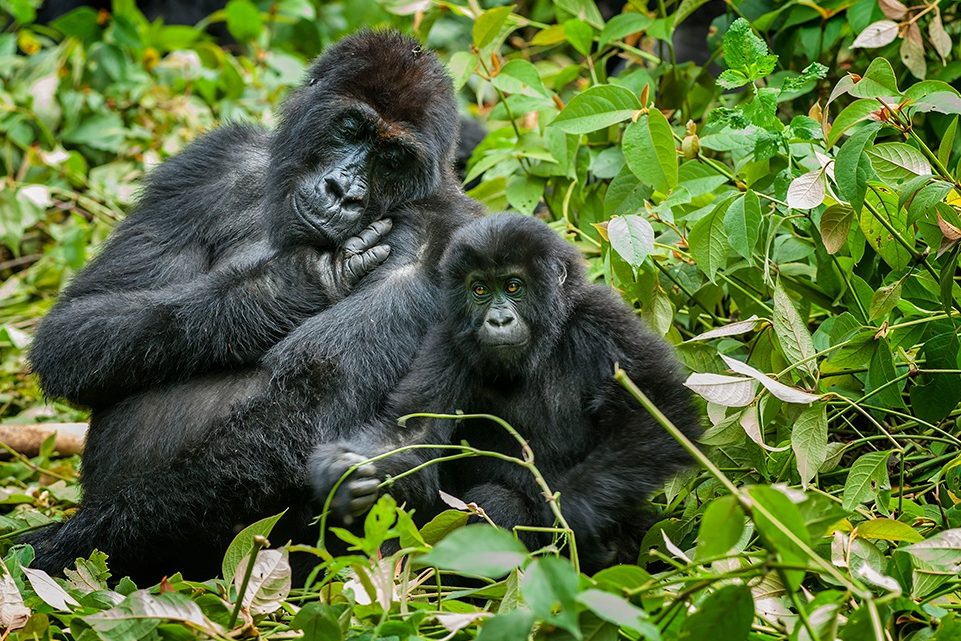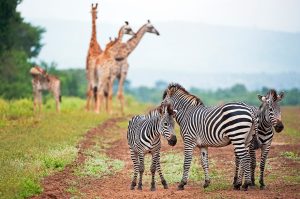Republic of Congo
I’m sending this to you from the rainforest in Congo, surrounded by vast trees and jungle noises in one of the loveliest, remotest places I’ve ever seen. Yesterday, flying at 150 feet above the canopy, I glimpsed in a clearing a family of relaxed gorillas gazing up at me, a visitor from another world.
When I set out as a young reporter in Africa thirty-six years ago, I drafted my stories on a typewriter. I had to travel to a city to book a reverse-charge call that took hours to come through, then dictate my words to the paper’s copy desk, or type it out on a post office telex machine.
For years if you dialed Somalia, you heard only electronic ether, ghostly voices and lonely Morse signals
I wrote letters to old girlfriends in England, or to my parents at home in Kenya, where we still had no telephone — my father being so unfamiliar with the device that on the rare occasions he spoke on one he used to say “over” at the end of a sentence. If we had urgent messages, we sent telegrams.
My first job at Reuters was to cover the huge spaces across the Horn of Africa that had fallen into the hands of rebel guerrilla groups, and there were no telephones in EPLF Eritrea, TPLF Ethiopia or SPLA Sudan. On assignments I’d team up with rebel guides in dusty towns and drive across frontiers into Africa’s blank spaces, disappearing into the silence for weeks at a time until my notebooks were full and I was able to trek out again to file.
In Ethiopia, following a significant battle in which 10,000 government troops surrendered, I scribbled out my story on pages torn from my notebook, put them in an envelope and gave it to a messenger who had to drive north through the mountains for several days in order to transmit the words from a telex at rebel headquarters. It reminded me how one of the greatest Reuters scoops in history came with the relief of Mafeking during the Boer war, when the news was smuggled out in a train driver’s sandwich.
During the Somalian civil war, we saw men in Mogadishu ripping out the telephone exchanges and digging up the cabling to export to India for scrap. Finally, all lines to Somalia went dead and for years if you dialled the national code +252, you heard only electronic ether, ghostly distorted voices and lonely Morse signals repeated like pleas. An entire nation of people was lost, beyond reach, tumbled into an abyss. For some time, the Somalis relied entirely on high frequency radio to communicate with the outside world.
This was a lovely time, before cell phones and wifi. When we first farmed north of Mount Kenya, we had only VHF radio to talk to the rest of the world. At dawn each morning the farmers across Kenya had a radio call-up, which had been going since the Mau Mau emergency, when each of us checked in and talked about the weather. By now mobile phones had made their debut in our lives, but there was no network anywhere on the high plains unless you summited an anthill or climbed a spiky thorn tree to get a few bars of signal that came and went with the gusts of wind.
For many years we relied on satellite phones. In places like Rwanda, we’d carry around these huge sixty-pound boxes that contained a satellite dish one had to build for fifteen minutes, then switch it on (using power from a portable generator) and find a signal without frying one’s own testicles with radiation. Over the years the technology became more compact and I remember filing one Wild Life from a swiftly assembled sat dish on the bonnet of a Land Cruiser after a roadside bomb in Somalia.
Today that’s all gone and there are telephone masts in every corner of Africa. Mobile phones add half a percent of annual GDP growth to an African economy, but these things have also become our electronic tagging devices, so that one can never really escape at all from the world. Starlink is so fast and portable that you can now watch Netflix from a forgotten peak on the remote island of Socotra 150 miles east of Somalia.
But here in Congo I am told that many people still have no phones, no internet — some of them don’t even listen to the radio. This morning I woke up long before dawn to the sound of distant drumming from a local village. A strange bird called from the canopy forest and I pictured the family of gorillas I saw yesterday, sleeping blissfully on a branch, somewhere out there in paradise.
This article was originally published in The Spectator’s UK magazine. Subscribe to the World edition here.


























Leave a Reply